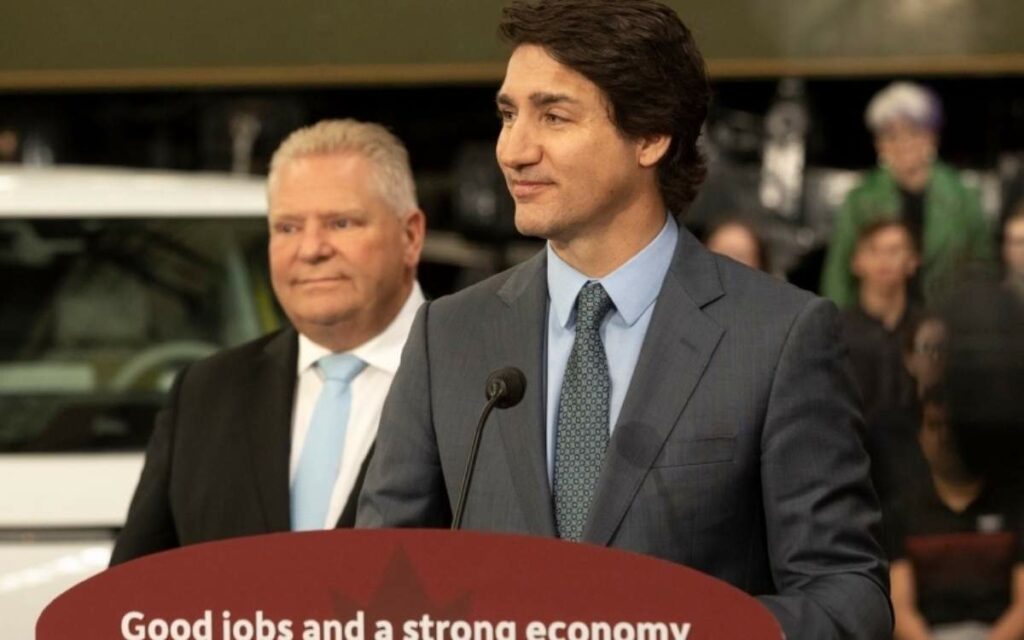
The Prime Minister and Premier of Ontario have found common ground in recent years as keen proponents of corporate welfare, shelling out billions of taxpayer dollars to companies like Stellantis and Volkswagen. Photo credit: The Canadian Press/Tara Walton
Prime Minister Justin Trudeau and Ontario Premier Doug Ford used to be political enemies. Yet, their shared love for corporate welfare handouts has led to an unlikely and expensive alliance that puts the interests of taxpayers at risk.
Just four short years ago, Trudeau’s primary re-election strategy was to run as a counterbalance to the once unpopular Ontario premier.
But that was then. And this is now.
Last month, linking arms and smiling from ear to ear, Trudeau and Ford announced the largest corporate welfare deal in Canadian history. Collectively, the federal and provincial governments are promising to hand $14 billion of taxpayer cash to Volkswagen in exchange for the company building a $7-billion electric vehicle battery plant in St. Thomas, Ont.
On top of the huge price tag, the fact that the corporate welfare handout is double the value of the new plant shows just how bad our governments are at negotiating agreements and managing the public purse.
The feds are ponying up most of the funds. But the province has committed over half a billion dollars to the project, as well as major infrastructure and energy capacity upgrades for the region.
From a 30,000-foot view, it’s obvious just how much of a raw deal the Volkswagen agreement is for taxpayers. Taxpayers are essentially paying for two plants and only getting one. And, with just 3,000 direct jobs being created, Canadian taxpayers are on the hook for more than $4 million per job.
But this isn’t the first time Trudeau and Ford have shacked up at the electric car battery corporate welfare hotel. In the last couple of years, they’ve teamed up to hand hundreds of millions of dollars to Fortune 500 automakers like the Ford Motor Company, Stellantis and Toyota to subsidize the manufacturing of electric car batteries in Ontario.
At the Volkswagen announcement, Trudeau and Ford feted each other’s leadership. But the only kind of leadership they’re showing is in how to waste taxpayer cash.
Imagine what else could have been done with $14 billion. We could have built a dozen new hospitals or slashed the federal sales tax by 1.5 percentage points for an entire year. No doubt the vast majority of Canadians would have preferred either one of those alternative options.
The fact that Trudeau and Ford had to take $14 billion out the taxpayer cookie jar to attract Volkswagen to Canada shows just how uncompetitive Ontario’s business environment truly is. If Ontario really was the best place to invest, as Ford continues to boast, Volkswagen would have come here without any offer of taxpayer cash.
More recently, news broke that Stellantis is demanding a deal akin to Volkswagen’s and is threatening to move its operations to the United States. The $14 billion Volkswagen giveaway is setting a terrible precedent that could snowball fast.
If Trudeau and Ford are genuinely interested in attracting investment, and not just cherry picking winners and losers, both governments would move to cut corporate taxes. Doing so would attract businesses of all shapes and sizes, not just a few lucky ones selected by government bureaucrats.
Both governments would have a lot of fiscal room to offer corporate tax relief if they show a willingness to put corporate welfare on the chopping block.
A Fraser Institute report shows that in the year 2019 alone, the government of Ontario spent $11 billion on corporate welfare handouts. And since 2017, Ottawa has handed out $38 billion to wealthy corporations.
Ending those handouts would free up billions of dollars.
With Canadians struggling to pay the bills, taxpayers cannot afford this hazardous new Trudeau and Ford corporate welfare alliance. Governments shouldn’t be handing out taxpayer dollars to wealthy companies like candy.
The feds and Queen’s Park need to end their corporate welfare love affair and leave more money in taxpayers’ wallets, where it belongs.

Jay Goldberg is the Ontario Director at the Canadian Taxpayers Federation. He previously served as a policy fellow at the Munk School of Public Policy and Global Affairs. Jay holds a Ph.D. in Political Science from the University of Toronto.




















